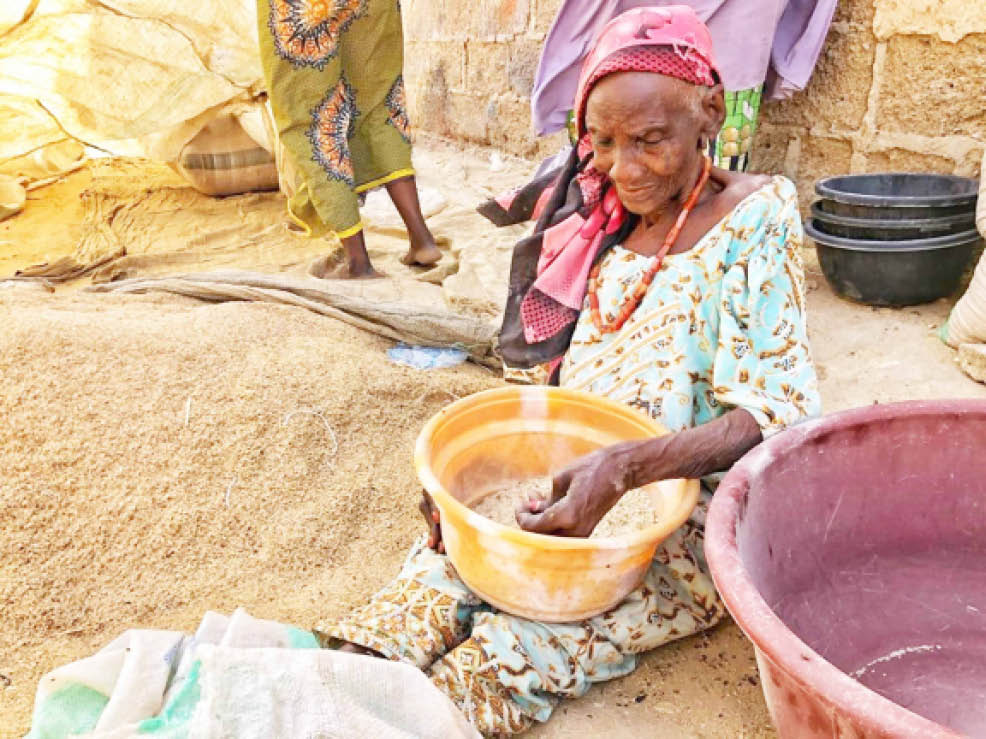For many years, Garko Rice in Kano State has been a brand that signifies fairly milled local rice. This rice is processed by women who sort and parboil the rice.
Also, Kura Local Government Area of the state has become synonymous with rice over the years. There also, women parboil paddy rice for domestic and commercial purposes.
- #EndSARS: Oluwo Seeks Inclusion Of Traditional Rulers In Panel Of Inquiry
- We’re Reinventing Northern Nigeria’s Rich Heritage- Director, Arewa House
Our correspondent in the state reports that the coming of local milling machines (mostly owned by men) is gradually taking over the jobs of these women. Most of the women are struggling to remain in the rice milling business.
The women are now majorly involved in paddy parboiling and winnowing at the local mills. Some remain at home to do the parboiling for those with paddy rice willing to mill.
Garko
According to a 43-year-old Hajiya Maimuna Garba, women in Garko have given their own fair share of contribution to rice processing in the area which, she said had provided the brand name that everyone in the area was proud to be associated with.
Hajiya Maimuna explained that initially women were doing the sorting and parboiling, but that they now sat back at home and did the parboiling only, adding that this was as a result of the introduction of a de-stoner machine.
She said, “We now stay at home and use our experience to parboil paddy for the numerous milling machines. Though there has been a reduction in the work load, that doesn’t mean there has been a reduction in what we earn. Presently, we earn more than what we used to earn when the work load was much.”
Another woman in the area, Malama Maryama Hannafi, said she had been in rice milling business for over 25 years but that she had never received any form of training on rice processing.
According to her, the name made by Garko in rice processing is self-motivation driven by well-determined people of the area.
She added that women were now relegated to parboiling only as men had seized the business from them due to the fact that they were more financially viable than the women.
Similarly, Alhaji Sule Sami’ila alias Alhaji Manu revealed that the recent development recorded in rice milling in Garko was as a result of peoples’ efforts.
According to him, they began acquiring the machines without even knowing how to operate them and later hired operators from Kura LGA to train them.

Alhaji Manu said, “I have over five rice milling machines with two polishers and two de-stoners. These were acquired based on the challenges we faced as millers in Garko. That was why we decided to takle the challenge by ourselves. We did what we had to do in ensuring that we remain afloat in the business.”
Kura
Initially, rice production in the area was done mainly within the irrigated perimetre of the Kano River Irrigation Project (KRIP). Lowland varieties of rice such as SIPI and WITA are mainly grown in the area.
According to Malama Hafsat Bara’u, a 41-year- old woman, parboiling paddy as an enterprise is a cottage industry in the area as most rice producing households operate a parboiling unit.
Malama Hafsat explained that household parboiling units were usually established with the aim of parboiling rice for domestic use, but that due to the increasing demand for parboiling services, such units now parboiled rice for processors on commercial basis.
Another woman in the area, Malama Maryama Baballe Kura, revealed that parboiling was a women-dominated enterprise in the area and that as such many women had been earning a living through it.
Malama Maryama further said that with the introduction of the machines, women were restricted to parboiling and winnowing as millers in the area could not afford the needed machines due to poor purchasing capacity.
She explained that, “Though milling in this area is dominated by men, as women are not directly involved, around each milling unit, you will find a number of old women and young girls who usually provide winnowing services to processors.
“The rice is winnowed in order to properly separate the husk from the grains. The cost of this additional processing is charged separately from that of milling, and this is where we earn our income.”
According to one of the owners of the several milling points in Kura, Alhaji Yakubu Ahmad Adam, millers render services to their customers for a fee which is usually charged per bag of paddy.

 Join Daily Trust WhatsApp Community For Quick Access To News and Happenings Around You.
Join Daily Trust WhatsApp Community For Quick Access To News and Happenings Around You.


